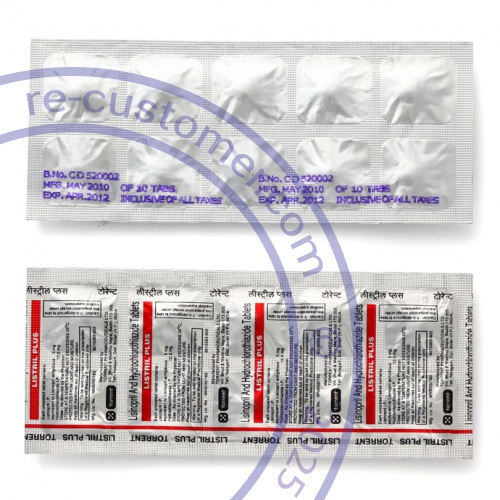Lisinopril and Hydrochlorothiazide tablet
What is this medicine?
LISINOPRIL; HYDROCHLOROTHIAZIDE is a combination of a diuretic and an ACE inhibitor. It is used to treat high blood pressure.
What should I tell my health care provider before I take this medicine?
They need to know if you have any of these conditions:
- bone marrow disease
- decreased urine
- heart or blood vessel disease
- if you are on a special diet like a low salt diet
- immune system problems, like lupus
- kidney disease
- liver disease
- previous swelling of the tongue, face, or lips with difficulty breathing, difficulty swallowing, hoarseness, or tightening of the throat
- recent heart attack or stroke
- an unusual or allergic reaction to lisinopril, hydrochlorothiazide, sulfa drugs, other medicines, insect venom, foods, dyes, or preservatives
- pregnant or trying to get pregnant
- breast-feeding
How should I use this medicine?
Take this medicine by mouth with a glass of water. You may take this medicine with or without food. Take your doses at regular intervals. Do not take your medicine more often than directed. Do not stop taking this medicine except on the advice of your doctor or health care professional.
Talk to your pediatrician regarding the use of this medicine in children. Special care may be needed.
Overdosage: If you think you have taken too much of this medicine contact a poison control center or emergency room at once.
NOTE: This medicine is only for you. Do not share this medicine with others.
What if I miss a dose?
If you miss a dose, take it as soon as you can. If it is almost time for your next dose, take only that dose. Do not take double or extra doses.
What may interact with this medicine?
- barbiturates like phenobarbital
- blood pressure medicines
- corticosteroids like prednisone
- diabetic medications
- diuretics, especially triamterene, spironolactone or amiloride
- lithium
- NSAIDs like ibuprofen
- potassium salts or potassium supplements
- prescription pain medicines
- skeletal muscle relaxants like tubocurarine
- some cholesterol lowering medications like cholestyramine or colestipol
This list may not describe all possible interactions. Give your health care provider a list of all the medicines, herbs, non-prescription drugs, or dietary supplements you use. Also tell them if you smoke, drink alcohol, or use illegal drugs. Some items may interact with your medicine.
What should I watch for while using this medicine?
Visit your doctor or health care professional for regular checks on your progress. Check your blood pressure as directed. Ask your doctor or health care professional what your blood pressure should be and when you should contact him or her. Call your doctor or health care professional if you notice an irregular or fast heart beat.
You must not get dehydrated. Ask your doctor or health care professional how much fluid you need to drink a day. Check with him or her if you get an attack of severe diarrhea, nausea and vomiting, or if you sweat a lot. The loss of too much body fluid can make it dangerous for you to take this medicine.
Women should inform their doctor if they wish to become pregnant or think they might be pregnant. There is a potential for serious side effects to an unborn child. Talk to your health care professional or pharmacist for more information.
You may get drowsy or dizzy. Do not drive, use machinery, or do anything that needs mental alertness until you know how this drug affects you. Do not stand or sit up quickly, especially if you are an older patient. This reduces the risk of dizzy or fainting spells. Alcohol can make you more drowsy and dizzy. Avoid alcoholic drinks.
This medicine may affect your blood sugar level. If you have diabetes, check with your doctor or health care professional before changing the dose of your diabetic medicine.
Avoid salt substitutes unless you are told otherwise by your doctor or health care professional.
This medicine can make you more sensitive to the sun. Keep out of the sun. If you cannot avoid being in the sun, wear protective clothing and use sunscreen. Do not use sun lamps or tanning beds/booths.
Do not treat yourself for coughs, colds, or pain while you are taking this medicine without asking your doctor or health care professional for advice. Some ingredients may increase your blood pressure.
What side effects may I notice from this medicine?
Side effects that you should report to your doctor or health care professional as soon as possible:
- confusion, dizziness, light headedness or fainting spells
- decreased amount of urine passed
- difficulty breathing or swallowing, hoarseness, or tightening of the throat
- fast or irregular heart beat, palpitations, or chest pain
- muscle cramps
- nausea and vomiting
- persistent dry cough
- redness, blistering, peeling or loosening of the skin, including inside the mouth
- stomach pain
- swelling of your face, lips, tongue, hands, or feet
- unusual rash, bleeding or bruising, or pinpoint red spots on the skin
- worsened gout pain
- yellowing of the eyes or skin
Side effects that usually do not require medical attention (report to your doctor or health care professional if they continue or are bothersome):
- cough
- decreased sexual function or desire
- headache
This list may not describe all possible side effects.
Where should I keep my medicine?
Keep out of the reach of children.
Store at room temperature between 20 and 25 degrees C (68 and 77 degrees F). Protect from moisture and excessive light. Keep container tightly closed. Throw away any unused medicine after the expiration date.



